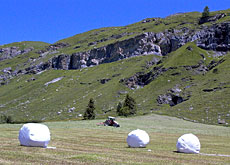
Mountain farms face renewed threat

One fifth of alpine farms could go out of business over the next ten years, according to a study released on Monday.
The number of agricultural employees will also dramatically drop as the farming sector undergoes far-reaching reforms.
The study, carried out by the Agroscope agricultural research centre in Tänikon and the Zurich-based consulting group INFRAS, looked at several future scenarios for alpine farming, including the impact of national and international farming policy.
Swiss farming has been subject to a number of reforms as subsidies come under pressure and the government seeks to implement changes to make the sector more competitive by 2011.
Added to this are moves towards liberalisation of the sector. Negotiations are underway with the European Union on free trade for agricultural products and with the World Trade Organization (WTO) on reducing trade barriers in the agricultural sector. WTO talks are set to resume this week.
Swiss farmers, who have seen their income fall in recent years, are against the reforms.
Cut back
According to Agroscope’s Stefan Lauber, alpine farming would be cut back in all cases – whether affected by international accords or a reduction in subsidies.
“One fifth of businesses will give up farming,” Lauber told swissinfo. “If the remaining enterprises can’t compensate the fall in revenue from farming with diversification activities, then the changes will be stronger.”
He added: “That means that up to 40 per cent might have to give up farming and at least a part of the affected farming families will have to leave the mountain regions.”
The report said the effect of reducing payments to farmers is expected to be decisive, especially if the agriculture sector is liberalised.
Forests would grow back on disused land (estimated at one fifth) and remaining farms would be bigger. More farms would start to diversify or take on a second occupation, such as tourism.
As for agricultural workers, numbers would fall by a quarter if payments were maintained at present levels or drop by 35 per cent if they were changed.
Types of change
However, Lauber said that not all change should be seen as negative. One such example is if a family farm was not handed down to the next generation. This would allow remaining farms to have better conditions, he said.
But he added that if the payment system was cut by 50 per cent for example, the effects would be more dramatic.
“Then one has to ensure that either a second occupation can be pursued and that some of these structures can be kept, or that these payments can stay on a level that will allow farming families to have enough income,” he said.
The Swiss Farmers Association said earlier this year that revenues would drop if prices continued to fall and markets became more open to foreign competitors.
It said it was prepared to adapt to new conditions with political support.
swissinfo
The study was carried out by the Agroscope federal research station at Tänikon and the consultants INFRAS.
It was produced as part of the Landscapes and Habitats of the Alps programme of the Swiss National Science Foundation.
Researchers collected data from different types of farms in the Surses and Belfort regions in Graubünden and took into account international and national farming policy.

In compliance with the JTI standards
More: SWI swissinfo.ch certified by the Journalism Trust Initiative






























You can find an overview of ongoing debates with our journalists here . Please join us!
If you want to start a conversation about a topic raised in this article or want to report factual errors, email us at english@swissinfo.ch.